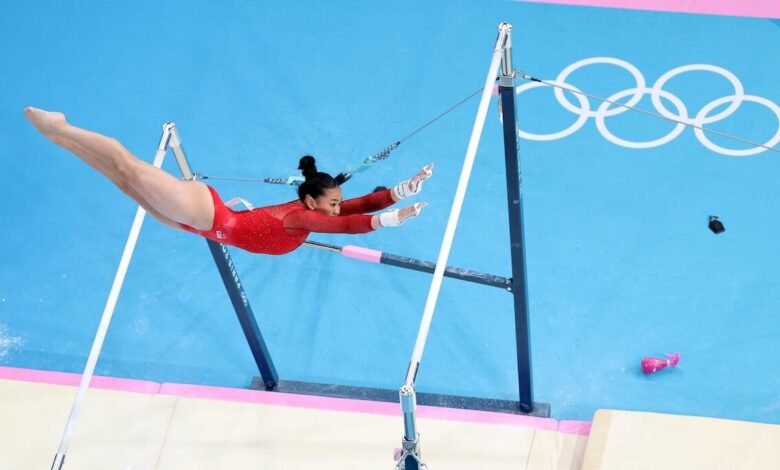Suni Lee takes bronze on bars for third medal at Paris Olympics

PARIS — As her confidence waned and her body began to push the boundaries of normal, Sunisa Lee returned to her comfort zones. Although she is an exceptional all-around gymnast, she is especially gifted on the uneven bars.
As she slowly recovered from two debilitating kidney diseases, it was the bars that helped Lee recover. She felt at home there, so comfortable that she began tinkering with a new release move, hoping to have it named after her. Her coach, Jess Graba, supported the plan, encouraging her to do “whatever it took to get her out of bed in the morning,” after the side effects of her kidney disease left her physically weak and mentally broken.
He didn’t push her; he didn’t even set goals. Graba didn’t know what was fair. And he knew that the athlete he’d trained since she was four would do it herself. Slowly, the fog lifted and the good news trickled in—a clear to train and, eventually, in January, an OK to compete. Still, Graba warned. She didn’t have to do this, to do anything at all, he told her. With an Olympic all-around gold medal already around her neck, she had nothing to prove. The cynics who dogged her, the ones who liked to remind her that she’d won the gold when Simone Biles pulled out, wouldn’t be silenced anyway. In fact, if she were anything less than she had been, they’d probably hit harder.
But Lee wanted what she wanted—another chance. And so Lee persevered through the lead-up to the Olympics, adding a little more at each stop. Bars and beam only at the Winter Cup in February; floor exercise at the Core Hydration Classic in May; and finally all-in at the Olympic Trials. Even as she expanded her repertoire, the bars remained her mainstay. A place where her successes strengthened her and rebuilt her confidence.
Of course, the better she felt, the better she performed; the better she performed, the more she wanted. That’s human nature. But even as her eyes opened to the possibility, and she allowed herself to fantasize about medals and places, Lee reminded herself that being here was enough.
When Lee was the last to start in the uneven bars final in Paris, she did her utmost to win. After all, you always want to win, but she did it mainly because it felt good.
When the score of 14.800 flashed, giving Lee the bronze medal, she covered her mouth in amazement, amazement that she had won a medal, but even more amazement at what she had done. “The last couple of days I’ve been looking at my scores and I’ve seen that if I kept up my routine, I could win a medal,” she said. “But really I just wanted to prove to myself that I could do it.”

Sunisa Lee covers her face in shock after seeing her score during the uneven bars final at the 2024 Olympic Games. (Photo: Jamie Squire/Getty Images)
Lee now has a stash of three Olympic medals from Paris — a gold medal in the team final, a bronze medal in the all-around and a bronze medal on the beam. She has a shot at a fourth medal tomorrow, on the beam. And all from a woman who in January wondered if the Olympics were a goal at all.
But if the time since her diagnosis has taught her anything, it’s that she’s even stronger than she thought. The gift of perspective has been almost liberating, allowing Lee to give herself grace and find the sweet spot between pushing for something and just being happy to be pushing.
She didn’t do the signature move she had planned on doing; she wanted to, but Graba told her it wasn’t worth the risk. He looked at the numbers. They didn’t add up. Kaylia Nemour, a 17-year-old French-born athlete who, because of a long-standing dispute with her federation, now competes for Algeria, was essentially untouchable. She is to bars what Simone Biles is to vaults: unbeatable unless she really messes up. Qiu Qiyuan, the reigning world champion on bars from China, would be just as hard to beat because of her difficulty.
Suni Lee wins a bronze medal on the uneven bars with a fantastic routine in the final! #Olympic Games in Paris
📺 NBC and Peacock photo.twitter.com/0V1TGS25sp
— NBC Olympics & Paralympics (@NBCOlympics) August 4, 2024
He didn’t want to tell her she couldn’t do something, but he also knew realistically that she probably wouldn’t win silver or gold. So aim, he told her, for what was achievable and find joy in achieving it. Her routine as it was constructed was good enough to get Lee on the podium; if she did the new skill and fell, that would destroy any chance of success.
At some point in her career, Lee may have resisted. Because of their long time together, Lee has no problem challenging Graba and in the past, he has usually followed her lead.
The last 18 months, however, have changed their dynamic. Graba is fiercely protective of Lee. He saw her at her lowest point, depressed and unable to even make it to the gym. When asked how he felt, he didn’t hesitate. “Stressed,” he said. It was his job, he believed, to keep her goals within reach, to temper her expectations without destroying her drive.

GO DEEPER
Gold medalist Suni Lee is back at the Olympics, with a team doctor helping her
“You worry all year long,” he said. “She’s done a lot to get here, and I just wanted it to pay off.”
The reward came when Lee mastered her routine and completed the circle. The one event that restored her at her lowest point rewarded her at her highest.
Required reading
(Photo: Dan Mullan/Getty Images)




